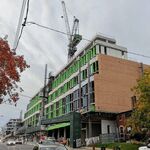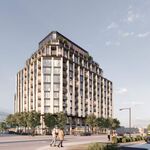TrickyRicky
Senior Member
Oliver Tweed,
I have noticed the same commercial disconnect phenomenon in other places in the city as well. Eventually, and when I mean eventually keep in mind the time frame could be over a decade, a new equilibrium will be reached where local residential needs will be met. In the mean time here are some points that might apply:
-The vast majority of small business owners are not good business people and have risk aversion for changing their business model or re-investing in their business. This has an intergenerational component to it as well. It often takes a generational change-over to initiate change
-Commercial leases are typically 5 or more years. People hang on to what they have even when their traditional client base is being eroded, such as an ethnic store where the established ethnic clientele have moved to the suburbs
-If you look at the profile of the typical property owner they tend to be immigrants over 60 years old and proud of their accomplishments since coming to Canada. They can also be stubborn and inflexible. They tend not to be as motivated by purely financial considerations. So they may ask for a rent they think they deserve on the basis of rising local property values or precedent setting commercial strips. These can be initially unrealistic however many care more about the number than the money (the building iself is likely not over-leveraged), meaning they would sometime rather leave the store empty than not get the rent they feel is justified
-The residents moving in tend to be drivers that make their larger purchases by car. At the same time they want quirky local spots like cute little restaurants and coffee shops with free internet. These are high risk, low return businesses. You have to love what you are doing (and have low rent) to operate such enterprises because they just don't make very much money and have a horrendous turn-over rate
These are just a few point to think about. Many of these issues are life-cycle and intergenerational trends that slowly and silently re-shape the city.
Edit: On the topic of the thread condo vs. house? I don't think it should be condo vs. house; however, in terms of capital appreciation and upside potential over time houses have historically preformed far better than condos. In another thread I posted some random Old City of Toronto examples comparing values from the mid-80's to the present.
I have noticed the same commercial disconnect phenomenon in other places in the city as well. Eventually, and when I mean eventually keep in mind the time frame could be over a decade, a new equilibrium will be reached where local residential needs will be met. In the mean time here are some points that might apply:
-The vast majority of small business owners are not good business people and have risk aversion for changing their business model or re-investing in their business. This has an intergenerational component to it as well. It often takes a generational change-over to initiate change
-Commercial leases are typically 5 or more years. People hang on to what they have even when their traditional client base is being eroded, such as an ethnic store where the established ethnic clientele have moved to the suburbs
-If you look at the profile of the typical property owner they tend to be immigrants over 60 years old and proud of their accomplishments since coming to Canada. They can also be stubborn and inflexible. They tend not to be as motivated by purely financial considerations. So they may ask for a rent they think they deserve on the basis of rising local property values or precedent setting commercial strips. These can be initially unrealistic however many care more about the number than the money (the building iself is likely not over-leveraged), meaning they would sometime rather leave the store empty than not get the rent they feel is justified
-The residents moving in tend to be drivers that make their larger purchases by car. At the same time they want quirky local spots like cute little restaurants and coffee shops with free internet. These are high risk, low return businesses. You have to love what you are doing (and have low rent) to operate such enterprises because they just don't make very much money and have a horrendous turn-over rate
These are just a few point to think about. Many of these issues are life-cycle and intergenerational trends that slowly and silently re-shape the city.
Edit: On the topic of the thread condo vs. house? I don't think it should be condo vs. house; however, in terms of capital appreciation and upside potential over time houses have historically preformed far better than condos. In another thread I posted some random Old City of Toronto examples comparing values from the mid-80's to the present.
Last edited:




